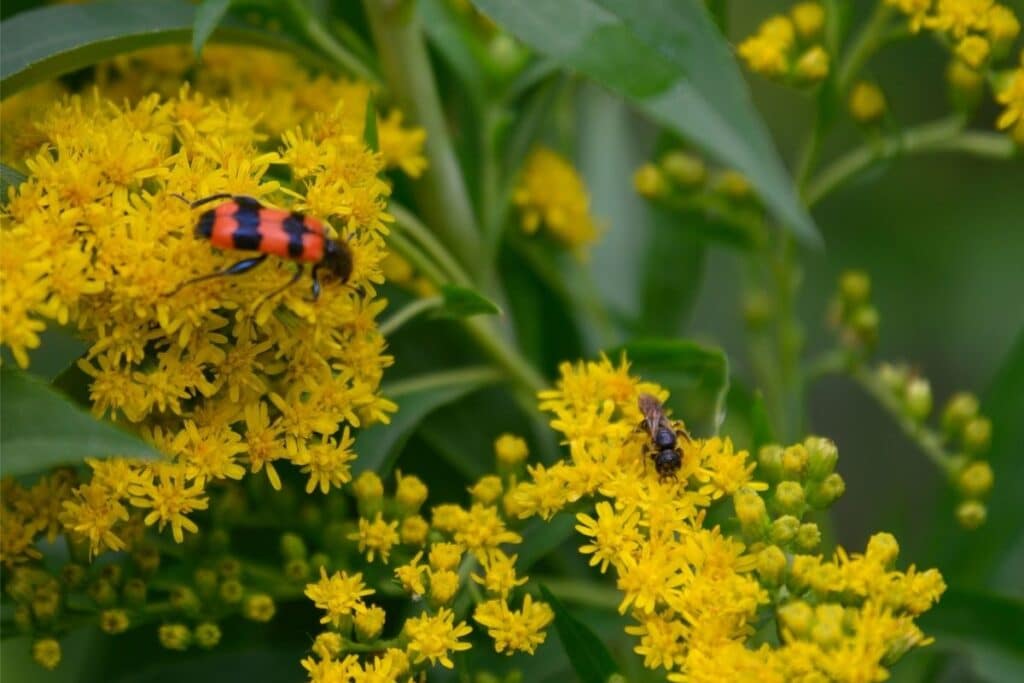As the weather starts to warm up, many people are starting to work on their gardens. While it can be fun and rewarding to watch your plants grow, it’s important to remember that you’re not the only one who likes them! Bugs love gardens too, and if you’re not careful they can quickly take over.
Here are some tips on how to keep your garden bug free so you can enjoy it all season long!
What Causes Bugs and Other Insects in the Garden?
There are many different factors that can contribute to an infestation of bugs in the garden. Some of these factors may include poor soil health, lack of nutrients, or a habitat that is out of balance.
In addition, certain pests may be attracted to certain plants and may be more likely to show up in a garden where those species are growing.
Additionally, some insects can overwinter in your garden and emerge when the temperatures start to get warmer, so monitoring your plants closely during these transitional seasons is important.
Ultimately, the key to avoiding an infestation of bugs in your garden is to maintain healthy soil and a balanced ecosystem so that your plants can thrive without inviting unwanted pests.
Damage Caused by Bugs in the Garden
When it comes to garden pests, bugs have to be one of the worst offenders. Not only do they feed on your plants and create unsightly holes in their leaves, but their constant buzzing and crawling can also be extremely annoying.
These pests feed on a wide variety of plants and can quickly multiply, rapidly overtaking a garden if left unchecked. They can also spread disease and parasites to healthy plants, causing damage to leaves, fruits, and stems.
Furthermore, some bugs such as squash bugs and other garden pests are known to literally eat their way through crops, devastating entire crops within just a few days.
To prevent this kind of damage in your garden, it is essential to take steps to control insect populations before they become too large. This might include using organic pesticides or releasing natural predators like ladybugs into the garden to keep pest levels in check.
Though it takes effort and commitment to manage bug populations effectively, doing so will ensure that your garden stays healthy and productive over the long term.
What Kinds of Bugs Are in the Garden?
Bugs can be a serious threat to any garden, causing significant damage that can harm plants and affect crop yields. Among the most common bugs found in gardens are aphids, caterpillars, whiteflies, and beetles.
Many gardeners consider bugs to be nothing more than pests, but the truth is that most insects you’ll find in the garden are actually beneficial to plants.
For example, ladybugs feast on aphids, mites, and other destructive pests, helping to keep gardens healthy. Bees pollinate flowers and fruit trees, ensuring a bountiful crop.
Even some caterpillars can be helpful; as they munch on leaves, they release nutrients that help plants to grow.
Of course, there are also harmful insects that can wreak havoc on a garden. Aphids, for instance, suck the sap out of plants, causing them to wilt and die.
How To Keep Bugs Out of Vegetable Garden Naturally?
Whether you’re a seasoned gardener or just starting out, keeping bugs out of your vegetable gardens can be a big challenge. After all, many bugs are drawn to the moisture and nutrients found in organic soil, and they seem to have no trouble finding their way into your garden.
Start With Clean Soil
One strategy that can help is to start with clean soil. This means clearing away all weeds, removing rocks or other large objects from the ground, and tilling the area as needed. You should also amend your soil with compost or other nutrient-rich material that is less likely to attract bugs.
Use Physical Barriers
Once the soil is ready, it’s important to focus on pest-proofing your plants themselves. Place lightweight covers over crops such as lettuce and tomato plants, and consider also using traps or sprays for more stubborn pests such as beetles or grubs. With these steps in place, you can rest assured that your vegetable garden will be bug-free for years to come!
Buy Pest-Resistant Seeds
When it comes to growing a healthy garden, there are a few essential steps that every gardener should follow. One of the most important is to select pest-resistant seeds when you are starting out. These seeds will help to keep common invaders like aphids, beetles, and caterpillars at bay, so your plants can thrive without having to deal with constant disruption from these pests.
Thin Your Plants
Another key step is to thin your plants as they grow. By removing excess foliage, you create more space between each plant, giving them more room to spread their roots and grow strong. This also helps to keep pests away, as the dense foliage present in unthinned plantings makes for an ideal environment for unwanted insects.
Water Early in the Day
Good water management is essential when it comes to keeping bugs out of the garden.
One strategy is to simply minimize the amount of water that you use when gardening, as this is often a main attractant for pests. Installing underground irrigation systems or creating rain barrel systems can reduce the risk of overwatering and creating breeding grounds for critters.
When you do any overhead watering, be sure to do so early in the day. The more time your plants have to dry off before nightfall, the better.
Control Weeds
You can also take steps to make your garden bed less attractive to bugs by weeding regularly and removing any damaged plants right away.
Keep it Clean
To keep bugs out of your garden, it’s important to start by keeping your garden area clean and free from debris. This will help remove any potential hiding spots for unwanted pests, and make it easier for traps and other deterrents to be effective.
Weed the garden regularly and get rid of debris like dead plants, old gardening pots, and other messes.
Use Traps
You can try using simple traps, such as sticky bands or jars filled with soapy water. These simple strategies are often very effective for small insects like common greenflies or fruit flies. You can buy store bought insect traps or make your own out of household ingredients like vinegar or even beer (more on this below).
Try Beneficial Insects
You may also want to consider looking into the use of beneficial insects. These natural predators help to control harmful bugs while leaving useful insects alone, making them a great option for gardeners who want to avoid harsh chemicals or pesticides. You can purchase these insects online and release them in your garden (lacewings and ladybugs are examples).
Practice Crop Rotation
One of the best ways to prevent pests in the garden is to practice crop rotation. By planting different crops in different areas from year to year, you can disrupt the life cycles of many common insects and make it more difficult for them to establish themselves in your garden.
In addition, crop rotation can help to balance soil nutrients and improve drainage, both of which can lead to healthier plants that are better able to resist pests.
Pinch Dead or Infested Leaves
Another effective way to control pests is to pinch or cut off infested leaves as soon as you notice them. This will remove the eggs or larvae from the plant and prevent them from doing further damage. Get rid of dead plants so you don’t give these pests a place to lay their eggs.
Garden Lime for Japanese Beetles
Japanese beetles are a common garden pest that can quickly decimate a crop. These hard-shelled insects are difficult to control, as they are resistant to most pesticides. However, garden lime can be an effective way to deter Japanese beetles.
Garden lime is a type of limestone that is rich in calcium and other minerals. When applied to the soil, it helps to create an alkaline environment that is inhospitable to many pests. Garden lime also helps balance the soil acidity for plants, helping them to grow strong and healthy.
Diatomaceous Earth
Diatomaceous earth is a natural and highly effective way to control bugs in your garden. This powdery substance, which is made from the fossilized remains of diatoms, has sharp edges that cut through the exoskeletons of insects and cause internal damage.
When sprinkled liberally over affected plants, diatomaceous earth will kill off even the most stubborn pests, helping to keep your garden healthy and thriving.
Because it is completely natural and non-toxic, you can feel good about using diatomaceous earth to protect your plants without compromising their safety.
Grow Onions and Garlic
One of the best ways to repel bugs is to grow onions and garlic. Both of these plants give off a strong scent that bugs find unpleasant. In addition, both onions and garlic are effective at deterring a wide range of common garden pests, including aphids, spider mites, and beetles.
How to Keep Bugs Out of Your Garden Without Pesticides
Many gardeners are looking for ways to keep bugs out of their gardens without resorting to pesticides. Pesticides can be harmful to the environment and pose a risk to human health, so it’s no wonder that gardeners are seeking eco-friendly alternatives.
Grow Companion Plants
One of the best ways to keep bugs out of your garden is by planting pest-resistant plants. Certain plants, such as marigolds and lavender, produce natural chemicals that repel bugs.
You can also try companion planting, which is the practice of planting certain plants next to each other in order to deter pests. For example, planting garlic next to your roses will help to keep aphids away.
Cayenne Pepper
The strong odor of cayenne peppers is a deterrent for many types of insect pests. In order to get rid of pesky insects in your garden, simply sprinkle some cayenne pepper around the base of your plants or mingle it with your soil.
Over time, you will notice fewer and fewer visits from hungry bugs nipping away at your precious vegetables and flowers
Use Natural Insecticides
One effective strategy is to use natural bug repellents, such as neem oil or certain types of herbs. These organic compounds help to prevent bugs from invading your garden and keep unwanted insects away from precious foliage.
By incorporating these methods into your gardening routine, you can help safeguard your garden against pesky bugs and keep it healthy and beautiful all season long.
Dish Soap
One effective way to combat pests in your garden is to use dish soap. This readily available household product can be used directly on the affected plants, killing insects almost instantly. Because dish soap breaks down easily in the environment, it is also nontoxic and poses no risk to other organisms living in or around the garden.
Beer for Slugs
Slugs can be a major nuisance in the garden, feeding on both plant leaves and roots, and rapidly destroying any seedlings or young plants. Unfortunately, traditional methods for getting rid of slugs, such as traps or poison pellets, can be harsh and environmentally harmful.
However, there is a simpler and more natural solution to this problem: beer!
Simply digging small pits around vulnerable plants and filling them with a small amount of beer is an easy way to attract and trap these pesky pests. The yeast in the beer attracts the slugs into the pit, where they will quickly drown. And with no chemical toxins involved, this method is safe for both you and your garden.
Be Warned – Not all Bugs are Bad in the Garden!
Any gardener knows that bugs can be a real problem, eating away at leaves and destroying crops. However, there are some beneficial bugs that can actually help to keep your garden healthy.
Ladybugs, for example, are voracious eaters of aphids and other pests. Green lacewings are also effective predators of aphids, as well as caterpillars and whiteflies. Another helpful bug is the braconid wasp, which parasitizes caterpillars and kills them from the inside out.
So while not all bugs are good for the garden, encouraging the growth of beneficial insects can actually be a big help in maintaining healthy plant growth.
FAQs
How do you make natural insect repellent for plants?
You can make a natural insect repellent for plants by combining ingredients such as neem oil, garlic, onion, chili pepper, or essential oils like peppermint or lavender with water. Mix these ingredients in a spray bottle and apply to the plants as needed.
How do you get rid of green vegetable bugs?
To get rid of green vegetable bugs, you can try methods such as handpicking them off the plants, using insecticidal soap or neem oil sprays, introducing natural predators like ladybugs or parasitic wasps, or planting companion plants that repel these pests.
What is the best homemade insect repellent?
The best homemade insect repellent can vary depending on the specific pests you’re targeting and the plants you’re treating. Ingredients like neem oil, garlic, onion, chili pepper, or essential oils such as peppermint, eucalyptus, or citronella are commonly used in homemade insect repellents for plants.
Does spraying vinegar keep bugs away?
Vinegar may deter some pests temporarily, but it is not a comprehensive solution for insect control. Using a combination of vinegar with other repellent ingredients may enhance its effectiveness.
As you can see, there are a number of things you can do to keep bugs out of your garden. Some are simple and easy to implement, others may require a bit more effort. But all of them will help reduce the population of unwanted insects in your outdoor space. Have you tried any of these techniques?
See more: How to Keep Animals Out of Your Garden
*image by binder1/depositphotos







